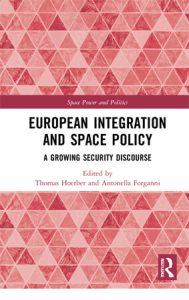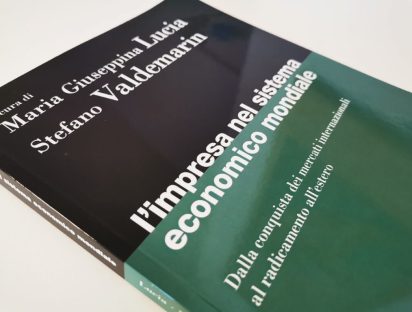
Photo by NASA on Unsplash
A Growing Security Discourse
Edited by Thomas Hoerber, Antonella Forganni
Over the years space policy has turned out to be no longer an insider’s domain. Its impact on European integration has become a topic of interest and academics have explored it. The present book, edited by Thomas Hoerber and Antonella Forganni, “European Integration and Space Policy” is based on one of these studies. It offers us an interdisciplinary approach giving European space policy a meaning for European integration.
Member states’ involvements
The recognition of the important role of space and defence in the European discourse has increased the importance of ministries in national governance. They must now put more emphasis on security and defence in and from space.
In the book, we can read amongst others that France has reinforced its current defence strategic monitoring and operations support, extended the Space Situational Awareness and developed a space defence capacity (French Ministry of Defense, 2019). Germany on its side, with the German 2016 White Paper on Security Policy and the Future of the Bundeswehr notes that satellite systems are a fundamental component of their critical infrastructure (German Federal Government, 2016). We also have the Luxembourg Defense Guidelines that view space as essential to Luxembourg’s space industry and cyberspace monitoring (Luxembourg Ministry of Foreign and European Affairs, 2017).
Also, at the international level, the European Space Agency (ESA) is involved in space and security-related activities, and its Council document provides guiding principles for its future involvement in order to strengthen the dialogue with the Member States and to support the Agency’s current and future activities (ESA, 2017).
Use of PNT (Positioning, Navigation and Timing): ESA and NASA
Despite their contrasting historical backgrounds, the European Space Agency (ESA) and the National Aeronautics and Space Administration (NASA) of the United States share the same goal: to promote the use of space for peaceful purposes. However, this does not prevent the pursuit of particular goals, which are explained in the book through the concepts of antagonism, hegemony and nodal points.
Space activities present certain risks to the autonomy of both military defence and the economy of the European Union. Thus, the concept of security has become a central element of European space policy.
We see that human security depends on public service; the European PNT system, Galileo, has been designed with this as one of its concerns. The other concerns are the economic advantages that the space industry can confer. Indeed, the USA’s GPS used to lead the commercial market for civilian PNT by providing free GPS services and offering receivers at affordable prices, mitigating the military aspect behind their activities. But lately, a competitive environment has been created with the Russian GLONASS, the Chinese BeiDou and the European Galileo system.
If USSR and China intended to set up their systems to reach parity with the USA, Europe based its discourse on civil and peaceful use.
The European Galileo system is a “civil control system offering guaranteed continuity of coverage”, a “regulated public service” (ESA 2017), focused on competition and economic growth, and not yet on military issues. ESA announced in 2016 its plans to invest in space traffic management once it was established as the key to the security and sustainability of European space agencies.
Legal issues
All this raises legal questions and issues such as the legitimacy of space colonisation, the space agencies involved and their role, the coexistence of private and public initiatives.
The book gives us answers to this with the International Space Station Agreement and goes even further by questioning its function using the Outer Space Treaty, the Rescue Agreement, the Liability Convention, the Registration Convention as sources.
European space operations have become increasingly important on the international stage and have strengthened the EU’s foreign policy activities. However, this obliges member states to maintain cohesion in space policy with common positions on strategic autonomy and security. Compared to the competitors of the United States, Russia, China and India, these measures, which are not yet effective, are crucial for Europe’s position in space.
Through “European Integration and Space Policy” we have discovered space programmes and their policies, the states that have joined them and their interests, as well as the challenges in space and the rules surrounding it. Nevertheless, with the increasing human presence and activities in space, from space exploration to space pollution, from the “peaceful purposes” to the militarisation of space, we wonder what we should be worried about given the progress in space technology.
European Integration and Space Policy
A Growing Security Discourse
Edited By Thomas Hoerber, Antonella Forganni
Series: Space Power and Politics
ISBN 9780367349127
Published December 22, 2020 by Routledge
204 Pages





